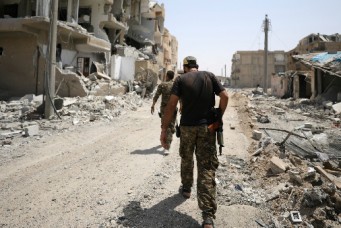Lessons of History, Old and New
Rebuilding Iraq and Syria, and addressing separatist movements, require learning from the mistakes of a century’s misrule.

Voters during the Kurdish independence referendum in Halabja, Iraq, Sept. 25, 2017. Alaa Al-Marjani/Reuters
Now that the modern-day Islamic caliphate is over and ISIS leaders are on the run, a question mark hangs over the future of Syria and Iraq as they rebuild—certainly physically, given the extent of urban devastation in the war, but more importantly politically and socially. The Arab uprising of 2011 impacted Syria more than it did Iraq, but in both cases there were disgruntled youth and ethnic minorities whose disaffection allowed the dismantlement of the state in Syria and prolonged conflict in Iraq. In both cases, and admittedly in different ways and degrees, the skeleton states that have survived the recent turmoil must learn the good governance lessons or risk suffering a return to the chaos and mayhem of the past six years.
Syria and Iraq, as modern entities both produced by the Sykes-Picot agreement, went through similar transitions, from monarchical protectorates to independent republics with dominant heads of state who ruled with an iron hand, often brutally put down rebellions and suffocated any form of dissent. The Iraq invasion of 2003 and the Syria uprising of 2011 have resulted in humanitarian tragedies in both countries. In both cases however the challenge now is to re-configure the state and start over with a new social contract—one that respects the rights of minorities and the dignity and equality of citizens at large.
The historical 1916 Sykes-Picot agreement receives a large share of the blame for the current turmoil in the Middle East from both Middle Eastern and Western critics. Arab nationalists of various shades and varieties often blame Great Britain and France for having dismembered the Middle East after the First World War and describe the Sykes-Picot agreement as having spearheaded Western conspiracies to keep the Arab World divided against itself. Western scholars and modern-day analysts are often critical of the same agreement but for different reasons. Advocates for separatism in the region will say that Sykes-Picot did not divide the area enough and left out significant minorities—such as the Kurds, ruled by Arabs, Turks and Iraqis, whereas colonial powers should have given them their own state. The reality is there were other factors at play for why Iraqi and Syrian borders are where they are, and some of them related to local wishes and historical realities rather than Western conspiracies. Realists will say that leaving existing regional boundaries and states where they are is the best way forward; this means building modern political systems that satisfy the needs of complex multi-ethnic and multi-religious populations rather than trying to undo the Sykes-Picot fabric and reassemble people according to their racial, religious or sectarian identities. Current leaders in the region bear most of the blame for why this isn’t so. As a realist myself, I concur with this view. If the leaders of modern Arab states had treated all their citizens equally and fairly there would have been no need for rebellions and attempts at secession.
Prospects for current political leaders doing the right thing and allowing a smooth transition forward are slim in either case but likely easier in Iraq. In Syria, there is no indication that President Bashar Al-Assad, who is on his way to regaining practical control over all of Syria, has learnt the right lesson from the past six years. Despite conspiratorial theories the ruling regime has clung to—that “Zionist-imperialist” forces conspired against Al-Assad in 2011—not many serious analysts would disagree that the Syrian strongman shot himself in the foot and blew up his own country by overreacting to popular demonstrations in 2011 and unleashing terrorists on both sides of the civil war. Many opportunities presented themselves for absorbing discontent from the early protests in Deraa to the solidarity marches and calls for reform in other parts of the country throughout the early uprising. Al-Assad heeded the advice from his henchmen that he would squander his father’s legacy, authority of the state and his own family’s security if he gave in to opposition demands and gave up any of his power. When armed conflict began in 2012, he was warned by those close to him that if he didn’t strike hard, like his father, President Hafez Al-Assad, did in 1982 in the Hama massacre, things would worsen quickly. The Al-Assad family’s entourage seemed essentially to be saying, “people must never lose their fear of you!”
Realism and power politics alone would seem to dictate to the Al-Assad regime to negotiate with Kurdish forces, first over Raqqa and next over the Kurdish region in the north. In 2011, Al-Assad had offered Syrian citizenship to Syria’s Kurds—something the Baath party had neglected to do despite five decades of ruling Syria—in order to entice them away from the opposition facing the regime in the wake of the Arab uprising. Now, following their victory in Raqqa, Syria’s Kurds are preparing a delegation to negotiate with the Damascus government the formation of a federal state across Syria. Syrian Foreign Minister Walid Moallem reportedly hinted at the possibility of negotiating a potential Kurdish self-rule on RT TV on September 25, a departure from years of official policy of denial of any such rights.
This step, though long overdue, would go a long way towards averting another lengthy war inside Syria, which would again invite regional and international intervention. Beyond dealing with this long-festering ethnic problem, the broader challenge for the regime would be to reconfigure itself as a democratic system that practices its authority via a transparent legal order rather than sheer brutality. Given the atrocities committed during the past six years—not to mention the state’s long history of oppression—it is hard to see a reformed and benign authority emerging in Damascus anytime soon. There remains an armed opposition to deal with, and bitter scores to settle, before any national reconciliation could be contemplated.
In Iraq, the difficulties are somewhat reversed. The democracy and human rights record of this government is slightly better than that of Syria. Saddam Hussein is long gone, and Baghdad has more recently righted some of the abuses of Nouri Al-Maliki’s government, despite lingering problems of corruption and the seemingly unfettered influence of Shia militias with significant ties to Iran. U.S. State Department and Freedom House reports recognize advances made under Prime Minister Haider Al-Abadi, with Freedom House still giving Iraq a rating of 6 on a scale of 1-7, seven being the lowest possible rating on civil and political freedoms. Syria receives a flat 7. On corruption, Iraq was ranked 170 out of 175 on Transparency International’s 2014 Corruption Perceptions index—one of the worst in the world.
Iraq’s chances of achieving progress on human rights and democracy are slightly higher than Syria’s but still a challenge on which they will need constant support and encouragement. If hostilities with Iraq’s Kurdish Regional Government are averted, a national reconciliation plan and a new federal agreement will need to be negotiated in earnest. U.S. and international pressure woulc help. In Syria, if the Kurdish issue is indeed satisfactorily resolved, a politically viable opposition to Al-Assad will need international support if it is to have any hope of breaking down his monopoly on power, if not removing him and his regime altogether.
Nabeel Khoury is a nonresident senior fellow with the Atlantic Council’s Rafik Hariri Center for the Middle East. On Twitter: @khoury_nabeel.



